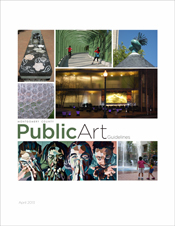Montgomery County
Planning Department
2425 Reedie Drive, 14th Floor
Wheaton, MD 20902
Planning Department
2425 Reedie Drive, 14th Floor
Wheaton, MD 20902
Public art can be a catalyst for community building, economic development, and creating a sense of place. Where it is located, how it connects to its surroundings, and whether it engages viewers can be as important as the design of the artwork itself.
Creation of public art is an option under the Montgomery County development review process when applications are in downtown areas and transit-area zones. Significant works of public art have been installed in Silver Spring, Bethesda, White Flint, and Wheaton. Learn more about the Art Review Panel that guides creation and installation of public art associated with private development.

Download the Montgomery County Public Art Guidelines(13 MB), which codify the policies and procedures that assign responsibility and set goals for the county's public art collection. The guidelines were produced in concert with the Arts & Humanities Council of Montgomery County.
Winner! The Public Art Guidelines publication won the 2013 Gold Marcom Award in the category for Government Annual Reports for its design and writing.
Public artwork became an amenity to be provided by developers in exchange for increased density as part of the optional method standards of the Zoning Ordinance in 1974. Under the optional method, developers are granted higher densities in exchange for significant public amenities and facilities. Optional method development is available in downtown areas and the Commercial Residential mixed-use zone. The Commercial/Residential Zone Guidelines provides criteria by which artworks are reviewed.
The optional method is intended to create a more attractive urban environment through a package of public amenities provided by the private developer. To qualify for the optional method, additional filings are required and certain development standards must be met including a public amenities package. Among the list of qualifying amenities are increased open space, affordable housing, farmland protection, environmental conservation, and public art.
Artworks are reviewed by the Art Review Panel (with representatives from the Public Arts Trust Steering Committee, PATSC), whose recommendations inform the final decision of the Planning Board. Although the artworks approved through the optional method are a public amenity, they are privately owned, operated, and maintained.
Public art is also created through taxpayer-supported funds. The Public Arts Trust aims to build and inspire communities through place-making and to nurture artists engaged in public art.
The public art program dates to the late 1970s, when County Council member William Hanna, former mayor of Rockville, established a countywide program that funded art as a percentage of capital projects. In 1983, the County adopted a program that mandated that 1% of certain capital projects be set aside for the acquisition and commissioning of artworks. The amount was amended twice--to .5% in 1988 and then to .25% in 1990.
In 1995, the Council adopted a law that requires consideration of .05 percent of each fiscal year's total capital expenditures to be allocated for public art. Funds vary each year.
Lead planners coordinate with the Art Review Panel to evaluate the developers’ public benefits package, provide professional guidance, and recommend conditions of approval for the consideration by the Planning Board. The Art Review Panel typically meets bimonthly. Please see their current schedule below.
Download the Art Review Panel submission form.
Planners presented a draft public art review policy (500 KB) to the Planning Board on December 13. View the staff report. (6.4 MB)
(All meetings 9:30 a.m.-12:30 p.m. at Park and Planning Headquarters)
These meeting dates are subject to change and are typically facilitated for the Applicant and their development team only.
Molline Jackson
301-495-4573
Molline.Jackson@montgomeryplanning.org
Last updated: January 19, 2016